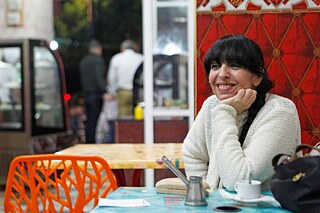I grew up in a bedroom community in Behren-lès-Forbach. There were only foreigners there: people from the Maghreb, Italians, Polish, and many others. They were the first wave of immigrants who worked for the collieries in Lorraines. We had our schools and we didn’t go anywhere else. My mother has lived in France for more than 50 years and can’t speak a word of French. She had no contact with French people; she only saw Algerians. We were now on the margins of French society.
In 79, I failed my school-leaving certificate. I stayed at home for a year. I looked for work and had many offers, but my father said to me: “Rohi bledek, tkhedmi fi bledek, hanaya matkhadmich! Go back to your country, work there, but not here!” My elder sister was already in Algeria and in our letters she told us about the exciting life of this period, the Agrarian Revolution, the voluntary work, the direct contact with the peasants, Boumediene’s dream...
In 1981, at the age of 20, I arrived in Algeria with my head filled with these dreams.
I lived with my brother in Sidi Fredj. I also had the delights of the sun and the sea, which I experienced for the first time. We lived on the shore front, facing the Thalassotherapy Centre. In the summer, concerts and festivals made the Sidi Fredj Port into a magical place.
After endlessly asking my brother about a job at the Thalassotherapy Centre, I finally went there myself. I met the head doctor, who hired me as a caregiver. I worked there for a year and it was a very beautiful adventure.
Later, a friend wanted to take the competitive exam to become an air hostess for Air Algeria, and I took it too. We were both successful and I stayed there for 35 years!
I was always seen as different, in my ways of thinking, expressing myself and also working. The label of “immigrant” followed me around for the entire length of my career. In reality, that protected me a lot. It enabled me to be myself, to be authentic. If I took certain liberties, such as in the way I dressed, people said: “Ah, hedi gawriya, it’s normal! She’s French!” They were much harder with the Algerians.
When I arrived, I spoked very little Algerian, but that didn’t bother me. People spoke French, and that’s probably why I didn’t learn the language perfectly. To this day I have kept this accent, which makes people see me as an immigrant, even though I’ve been living in Algeria for 37 years. I feel that I am Algerian, I mix with people, I live in a working-class area, I love such places! I love people as they are, because when you’re sincere, you ask nothing in exchange. Then you’ll be richly rewarded! I love Algeria, that’s why I came here. But I am first and foremost a world citizen. I believe that human nature is profoundly good, based on a balance which allows anyone to live happily wherever they are. Now I am here, and I make the best of it. That’s enough for me.
Photographer Leïla Saadna
Leïla Saadna is a visual artist and a director of documentary films. She has been living and working in Algiers for two years. After studying plastic arts in Paris, she oriented herself towards engaged and poetic film and artistic projects. Her working and research themes are post-colonial migration stories, the words and struggles of people affected by intersectional forms of oppression, such as racism and sexism, and in particular the experiences of women in a post-colonial context.
September 2018
